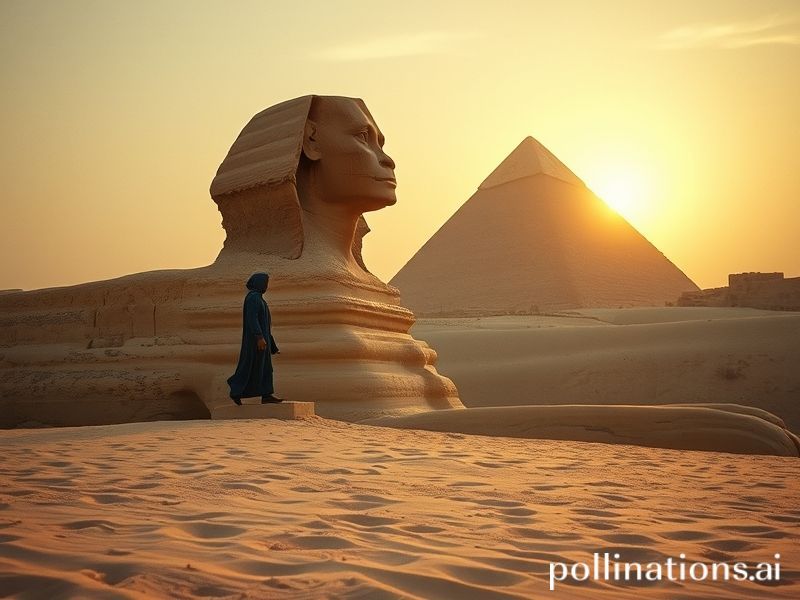Egypt: Where Ancient Wonders Meet Modern IOUs—A Global Parable in Sand and Debt
Egypt: Still the World’s Favorite Cautionary Tale with Pyramids
————————————————————-
Cairo—If history were a sitcom, Egypt would be the character who peaked in the pilot episode and now spends every season reminding the rest of the cast, “I used to run prime time.” Five millennia after inventing civilization, the country still tops bucket lists and donor spreadsheets alike, proof that brand recognition can outlive both empires and common sense.
From the Nile Delta, where the river politely forgets it’s supposed to be a desert, to the Red Sea resorts where Europeans roast themselves into human prosciutto, Egypt is the planet’s most photogenic contradiction. It sells pharaonic grandeur to tourists while negotiating IMF loans like a college freshman juggling credit-card offers. The Sphinx—nose famously missing, presumably to avoid smelling the politics—watches over it all with the same tight-lipped smile your bank manager gives when you mention “payment deferral.”
Global investors, bless their optimistic hearts, treat Egypt as a geopolitical pop quiz: Can a nation of 110 million, strategically wedged between Europe, Africa, and the Middle East, keep the lights on without blowing another fuse? Last year the answer was “sort of,” contingent on a $3-billion bailout and the assumption that wheat prices won’t decide to play hopscotch again. (Spoiler: wheat’s therapist says it’s still unstable.) The deal keeps Suez Canal traffic humming, container ships gliding past inflatable flamingos and existential dread in equal measure. Every day 12 percent of global trade floats through a 193-km trench dug by 19th-century laborers who never got dental. Modernity!
Meanwhile, Cairo’s 20-million-strong rush hour looks like a Hieronymus Bosch painting reimagined by Uber. Commuters inhale lead-flavored nostalgia while TikTok influencers livestream from climate-controlled SUVs, preaching hustle culture to audiences who can’t afford the data plan. The government, ever helpful, has promised a new administrative capital in the desert—because nothing says “sustainable” like air-conditioning a city from scratch. It will reportedly feature the tallest flagpole in Africa, a 200-meter middle finger to fiscal gravity.
Abroad, Egypt is everybody’s favorite regional multitool. Washington sends fighter jets when it needs a quiet partner, Moscow ships nuclear components when Washington’s distracted, and Beijing builds railways in exchange for future IOUs. All sides pretend this isn’t the geopolitical equivalent of polyamory with commitment issues. Europe outsources border enforcement to Egyptian coast guards so refugees can be redirected before they ruin anyone’s Mediterranean selfie. Human-rights groups draft stern press releases; the rest of us book Nile cruises.
Climate change, that most democratic of disasters, has turned the Nile’s annual flood into a moody teenager: sometimes too much, sometimes ghosting entirely. Upstream, Ethiopia’s Renaissance Dam fills its reservoir like a neighbor secretly siphoning your hose. Downstream, Egyptian farmers eye the water level the way New Yorkers watch the subway map—equal parts prayer and resignation. The UN calls for dialogue; the river, indifferent, just keeps flowing toward the delta that may soon be underwater anyway. Nature’s got a wicked sense of timing.
And yet the pyramids endure, Instagram-ready and algorithmically immortal. Every sunrise they cast shadows over a capital that runs on hope, caffeine, and subsidized bread. Tourists shuffle through Giza wondering why the stones feel smaller than in the brochure, unaware that disappointment is the one truly universal heritage site. Egyptians, for their part, have perfected the thousand-yard stare of people who’ve watched every episode of civilization’s reboot and still turned up for work the next morning.
So what does Egypt tell the rest of us, sprawled on our couches doom-scrolling inflation rates? That you can mortgage tomorrow to pay for yesterday and still be invited to every global summit. That monuments outlast the egos who build them, but maybe not the interest rates. And that somewhere between the river and the sand, there’s enough irony to fill a sarcophagus—assuming someone hasn’t already listed it on Airbnb.
History keeps rolling credits; Egypt keeps rolling bread. The audience applauds, partly in admiration, partly because the exit is blocked.







